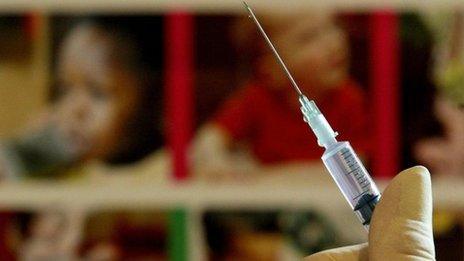Measles outbreak at Disney raises vaccination questions
- Published
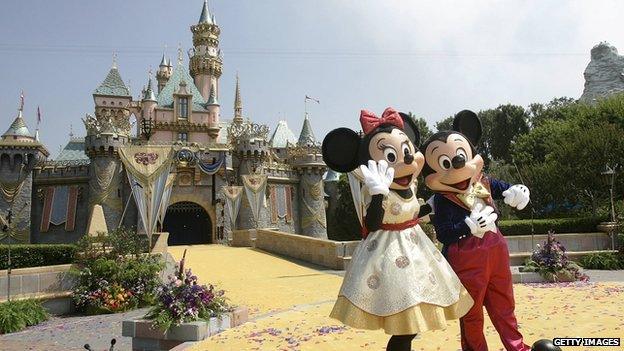
A California measles outbreak that has been traced back to Disneyland in Anaheim is prompting concern over the growing trend among some parents to avoid immunising their children against infectious diseases.
According to state officials, there are currently 59 cases of the highly contagious disease in California, which can be spread through the air and results in a fever, cough and rash that can be life-threatening.
"Of the confirmed cases, 42 have been linked to an initial exposure in December at Disneyland or Disney California Adventure Park in Anaheim, California," the California Department of Public Health writes in a press release, external. There are eight additional cases connected to Disneyland in other western US states and Mexico.
Public health experts say the disease was probably brought to the amusement park packed with holiday tourists by a foreign visitor, but it has spread in part due to the lower numbers of Americans who have been opting to receive the immunisation shots.
The US government announced in 2000 that measles had been eradicated in the country, but the disease has seen a steady rebound since then. The US Centers for Disease Control reports there were 644 new measles cases in 27 states last year - the highest number since the early 1990s.
The vaccination levels, external for children ages 19 to 35 months in the US stood at 91.9% in 2013, below the 92% rate that ensures "herd immunity" that offers protection for those who can't get immunised for medical reasons and adults whose immunisation has worn off. In Colorado, where two of the Disney-related cases have appeared, the rate was a national-low 86%.
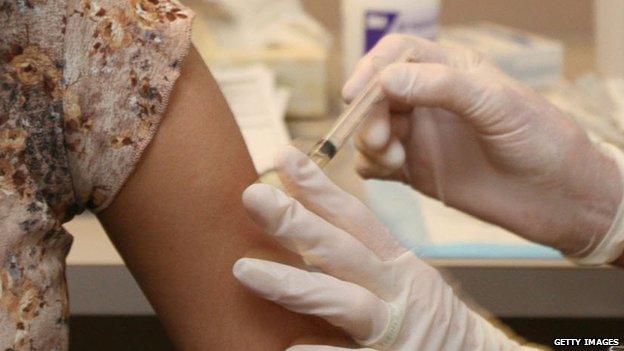
Measles immunisation numbers have been declining in the US
Perhaps not coincidentally, Orange County - where Disneyland is located - is home to one of the more active anti-vaccination communities, led by Dr Bob Sears, a paediatrician who caters to parents suspicious of the immunisation shots.
"While the vast majority of physicians are troubled by the anti-vaccination movement, Sears, 45, lends a sympathetic ear," Los Angeles Times reporter Paloma Esquivel wrote, external in a September 2014 profile. "About half his patients forgo vaccines altogether. To others, he offers 'Dr. Bob's' alternative and selective vaccination schedules, which delay or eliminate certain immunisations."
She writes that at some Orange County public schools, up to 60% of students had "personal belief exemptions" to required vaccinations.
"The unfortunate reality," writes, external Cornell University immunology Prof Cynthia Leifer for CNN.com, "is that more and more parents are choosing not to vaccinate their children for non-medical reasons. Some refuse vaccines on the grounds of religious beliefs; others refuse on the repeatedly disproved argument that vaccines contribute to autism."
She compares parents who decide not to vaccinate their children to a drunk driver "who makes a socially irresponsible decision that can endanger not only his life, but also the lives of the other drivers and passengers on the road".
While the danger is real, some wonder if this high-profile outbreak could be the wake-up call that prompts action.
"For much of human civilisation, that was how we lived, and with measles outbreaks at Disneyland and elsewhere, we're getting a taste of what our infection-plagued existence was like before routine vaccination," writes, external Paul Thornton of the Los Angeles Times.
"Fears over children falling seriously ill after standing in line for Space Mountain could take hold. Perhaps we ought to start listening to credentialed researchers and mainstream doctors instead of celebrities who studied at the 'University of Google' and the fringe physicians and activists who enable them."
He quotes one letter to the Times that disagrees with this view, however, emphasising that the decision not to vaccinate is one of parental freedom.
"It is my choice whether or not I want to be vaccinated," Clayton Graver writes. "It is your choice whether or not to wash your hands or take basic public health precautions. It is an individual's choice whether he or she wants to gamble with their child's life. It is not your place to say what they have to do."
There may be growing consequences for parents who make the choice not to vaccinate, however. In the California town of Huntington Beach, a high school in which a student was diagnosed with measles sent home, external 24 classmates for three weeks when they could not prove they had been immunised.
In Utah more than 380 people have been asked, external to self-quarantine after being exposed to two children who returned from Disneyland with the disease.
A Washington state doctor recounts, external a conversation with a father whose 13-month-old daughter, who had yet to be immunised, contracted measles during a vacation to Disneyland
"I told him he should channel that energy and speak out to support immunisations as a matter of public health," Neil Kaneshiro writes in the Seattle Times. "Healthcare providers continue to voice support, but clearly that has not been adequate to stem the tide of anti-vaccine sentiment that continues to grow."
The most recent outbreak has renewed calls to make vaccination waivers - which allow parents to send unimmunised children to public schools - more difficult to obtain, such as adding informed consent clauses or having them expire at the end of every school year.
"If only we could say we didn't see this coming," write, external the editors of the Sacramento Bee. "But it's no surprise."
- Published24 March 2014
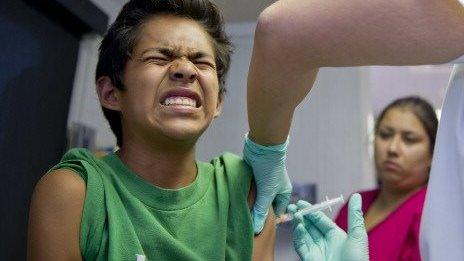
- Published6 February 2014
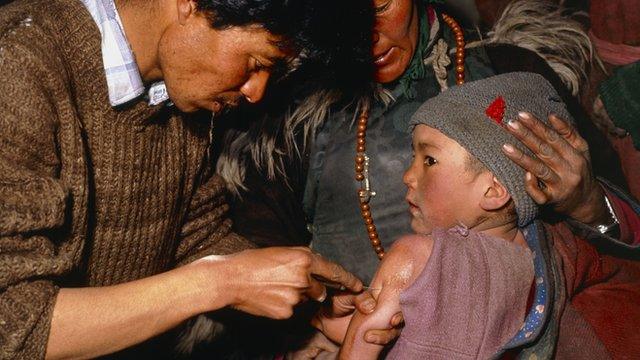
- Published24 October 2013
